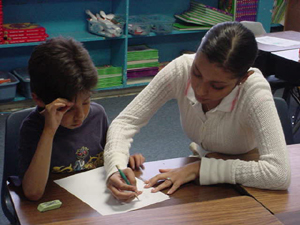
“Service-Learning teaches the students what I can’t in a classroom,” said Karen Marcotte, Professor of Interdisciplinary Studies/Humanities/History, who started using the Service-Learning program here in 1997.
Service-Learning has helped many students get experience in their future profession before graduating with their degree.
The idea of Service-Learning originated from the “Do-It!” Service Learning Program, which was part of the Methodist Church Activities at San Antonio College. The “Do-It!” Service-Learning Program started as a nationwide movement. The program soon reached The University of Texas at San Antonio.
Palo Alto students in this mentorship program go to local elementary schools or middle schools and work one-on-one with students. Some elementary schools that benefit from the Mentorship and the Service-Learning program are Benavides Elementary and Palo Alto Elementary, which are in the South San Independent School District, and Bob Hope Elementary, which is in the Southwest Independent School District.
A few
teachers offer Service-Learning as a requirement in their classes.
Helen Kirk, a Math professor, has her students do Service-Learning
in Math.
If you enroll in Math 1350: Fundamentals of Math I or Math 1351:
Fundamentals of Math II, be prepared to learn how to teach math to
local elementary
and middle school children. For Service-Learning involving math,
contact Helen Kirk at 921-5218.
Rob Hines, a History teacher, has his students do a “Small Town History
Project” that allows the students to gather information about a city and
make their own
webpage with that information. The “Small Town History Project” helps
out a variety of people. These web pages have educated many people who were
unaware of the many small cities in Texas. For further information regarding
History
Service-Learning,
contact Rob Hines at 921-5098.
Those interested in Criminal Justice can attain another beneficial Service-Learning
opportunity. Steve Mardock, a Criminal Justice Professor, has had his students
participate in Service-Learning through various organizations in the city
since the Fall of 2001. A journal is required to evaluate the student’s time
with the program.
“The “diary of experiences” is feedback and reflection of what
the student thinks of the program,” said Mardock.
The San Antonio Police Department, Bexar County Juvenile Probation Department,
and the Bexar County Adult Probation are just a few places the students go
to fulfill their Service-Learning requirements. These three classes: CRIJ
1307 Crime
in America, CRIJ 2313 Correctional Systems & Practices, and CRIJ 2328 Police
Systems & Practices contain a Service-Learning component. For further information
about Service-Learning in Criminal Justice, contact Steve Mardock in GE 237or
call 921-5353.
Service-Learning is for every major. No student is left out from getting
a taste of his or her future profession. Students can be majoring in Vet-Tech
or in Chemistry
and can still participate in Service Learning.
If you are interested in Service Learning and want to become involved, please
contact Karen Marcotte in GE 241 or call 921-5035. Or contact any of the
professors listed within the story for further information regarding Service-Learning.